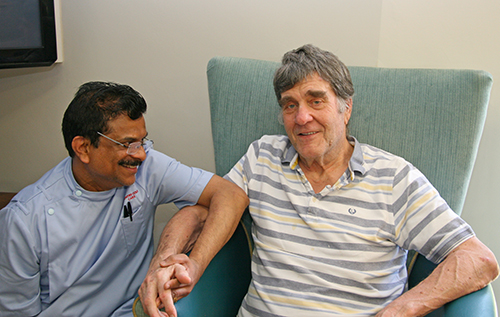Our Home Manager at Westfield Nursing Home in Boston was recently recognised for her and her team’s outstanding dementia care at the Lincolnshire Care Awards. Nogi John was nominated for the award by Operations Manager Suria Webb.
Suria explains how the team approach at Westfield Nursing Home has worked so well when caring for residents with dementia. Suria explains:
“Nogi has built a well-motivated team that is not afraid to tackle challenges, she recently admitted a gentleman who had been in hospital exhibiting very challenging behaviour. He had been placed unsuccessfully in several care homes and his family were desperate to find a permanent place for him. On witnessing the stress and anxiety the family were under she was determined to help.”

His daughter describes how he was labelled an ‘aggressive dementia patient’ and no one could see past that label. “It was devastating for us, to me he is my Dad” she said “It wasn’t until Nogi came along that we could see any hope, I honestly don’t think he’d still be with us if it wasn’t for Westfield Nursing Home. Nogi was the only one who saw the person not the label”.
At first, his behaviour was very challenging, despite being bed-bound, he did a lot of damage to his bed and room. However, the staff were determined to work with him and with the support of his GP they slowly started to see improvements in his health. When he arrived, he was severely under-weight and not eating properly, however within a few months, he was eating a more balanced diet and had gained 10kg.
Through one-to-one sessions with staff the resident’s cognitive function improved, he started to recognise individual staff members and remember their names. Six months later he is a different person, he is calm and through gentle chair-based exercise has started to weight bear and now plans to start walking again.

With the right care and support in place his dementia has receded, he enjoys days out and activities and looks forward to daily visits from his family. He has built up a special relationship with the Home’s Maintenance man Alex, who takes time to sit and talk with him and they’ve built a real rapport and friendship.
“It’s been the whole approach here” his wife explained “the care, the environment, the food and the encouragement of the staff, you really can’t fault it. Everyone has taken time with him, not just the care staff but the nurses, housekeepers, maintenance, everyone”
“I couldn’t ask for more,” he said “they are all fantastic here”
“We call him our ‘miracle’” said Home Manager Nogi “the change in him has been amazing, he is 100% better than when he first arrived, it’s been a long road, but the patience and perseverance of the whole team here has been the key, we were determined not to give up on him.”
Nogi involved her whole team in his care, taking a holistic approach addressing his diet and nutrition as well as his immediate care needs and behaviour. This is typical of Nogi’s approach, as she empowers her team, giving them confidence and determination to provide the very best care for everyone. Nogi has taken the lead, ensuring the team take a calm and gentle approach. Her patience and perseverance paid off and the transformation of the resident is irrefutable, bringing a new lease of life to the resident and his family cannot speak highly enough of Nogi and her team.
The model of dementia care used at Country Court Care is the “Enriched Model of Dementia” developed by the late Professor Tom Kitwood. Tom Kitwood described five overlapping psychological needs that people with dementia have, which come together in a central need for love.
Ensuring these needs are met helps a human being feel relaxed, secure, at ease, valued and of use:
